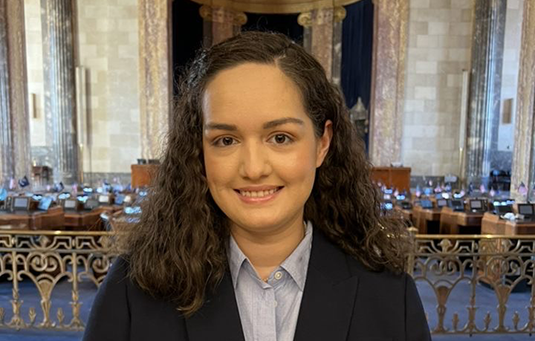Former New York Times investigative reporter Christopher Drew moved back to his native state to start teaching at Louisiana State University in 2017. And from the beginning Drew decided to engage his students in reporting projects.
“I didn't want a job where the students are doing stories to just turn in to class. Students know the stories are never going to see the light of day. So they're not necessarily motivated to do everything they need to do,” Drew said.
And so Drew ramped up LSU’s Manship School News Service program – expanding a statehouse news reporting team and sending students the short three miles to the Baton Rouge statehouse.
“We all know that journalism is a high stakes craft, especially these days. And the best way to learn is to do it and do it for publication. But with guidance from a professional mentor,” Drew said.
The program, which was started by former Manship professor Jay Shelledy in 2016, benefits the students, the state’s news outlets and citizens of the state.
“It’s one of those rare things in life that's a win-win-win,” Drew said. “It's great for the students. They get real world reporting experience. They have to live up to the demands of working for publication, for accuracy and fairness. And they get clips that help them with jobs.”
“It's great for the readers around the state, where up to 90 digital publications, newspapers and TV station and radio station websites have run at least one of our stories, and some of them run them regularly. Most of them are hungry for news and have no way to get news from the capital with all the cutbacks in the business,” Drew said. “And it's also great for our school because we get to do a public service. Everything we send out is free for anybody to use.”
Coordinated through “field experience” classes, the program averages 10-12 students a semester, Drew said. The experience can be key in finding jobs and in turning the students into future reporters.
“When I signed up for the prerequisite class, I had no intentions of becoming a journalist,” said Piper Hutchinson, a spring 2022 student. “To get ready for the actual statehouse class, I signed up to work at The Reveille, our student newspaper. Between The Reveille and the Manship News Service, I got hooked on reporting.”
Hutchinson now works part-time for the Illuminator – an independent, nonprofit news organization based in the capitol.
“The program put my byline in front of the eyes of every editor in the state, multiple times a week, for months. That really helped when I started looking for summer internships. My current editor really liked my work and recruited me for an internship. I later learned that the internship was basically an audition period for a full-time gig, which I got. It's a fantastic job and I am so glad I get to keep working in the capitol.”
The stories the students work on can be the day to day of the legislature from committee meetings to press conference and sometimes longer-form high impact pieces. For example, Hutchinson wrote a detailed follow-up story to the violent death of black motorist Ronald Greene and the subsequent political crisis and impact on redistricting decisions. You can see the story here and an interview with Hutchinson here.
Students in the spring reporting class are required to take a fall class to prepare. Here students hear from legislators, heads of state departments, lobbyists and political figures and study polling data, facts about the state and background on issues that will be current in the spring. Students can take the spring class twice.
As in other states as statehouse reporters have declined, interest in the service has grown. Drew sends the stories, after he has edited and approved them, to about 90 outlets around the state. Stories are also promoted on social media and through a twitter feed that sometimes generates live conversation with legislators and advocates, Drew said.
Space is provided in offices rented by Gannett on press row inside the Capitol– an office that once had four reporters and now has one.
Looking forward, Drew would like to keep expanding the number of enterprise stories students do. As someone who grew up in the state, Drew thinks stories that put Louisiana in context with other states add tremendous value.
“I like to look for enterprise stories that make people think about things here that they might not think about,” Drew said. “For example, we did a story about how Texas and Oklahoma have gone way beyond Louisiana in embracing wind and solar and how many jobs it's created and how creating those jobs is a more sensible way to move forward instead of just digging in your heels. So that's helped spark the debate.”
Drew has extended this concept to other high-level in-depth reporting classes, where students work in groups on enterprise stories that they can offer to news outlets in the fall and spring. LSU has also raised money to pay students in the summer to work on these stories.
But the program works because Drew is the final backstop for everything.
“I'm a stickler for accuracy, fairness. Anything I see that raises any questions at all in my mind, I'm sending back to the student reporter to talk to people again. And I just think that putting them on the high wire where they've got to come through is the best way to prepare them for jobs.”
For more information
Christopher Drew cdrew2@lsu.edu or manshipxgr@gmail.com


